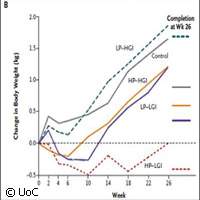How high-protein diet is secret to losing weight
EU-funded researchers have made an interesting discovery about what it takes to lose weight. People should maintain a high-protein diet with plenty of lean meat, low-fat dairy products and beans, and eat fewer finely refined starch calories, such as white bread and white rice, according to the University of Copenhagen, Denmark-led researchers. The study, the world's largest to focus on diet, was funded in part by the DIOGENES ('Diet, obesity and genes') project which clinched EUR 15 million under the 'Food quality and safety' Thematic area of the EU's Sixth Framework Programme (FP6). The findings are published in the New England Journal of Medicine. The researchers of the large-scale random study, called Diogenes, investigated the optimum diet for preventing and treating obesity. The scientists, headed by the Faculty of Life Sciences (LIFE) at the University of Copenhagen, compared the official dietary recommendations in Europe with a diet based on the latest knowledge about the importance of proteins and carbohydrates for appetite regulation. Nearly 800 European families participated in the study, including 938 adults and 827 children. The overweight adults initially followed an 800 kilocalories (kcal) a day diet for 8 weeks, losing an average of 11 kilograms (kg). The researchers then randomly assigned the participants to follow one of five different low-fat diet types for six months to test the most effective diet type at preventing weight regain. The five diet types tested were a low-protein diet with a high glycemic index (GI); a low-protein and low-GI diet; a high-protein and low-GI diet; a high-protein and high-GI diet; and a control group that followed the current dietary recommendations. The GI is a measure of the ability of carbohydrates to increase blood glucose levels when absorbed in the body. Food with a low-glycemic index causes blood glucose levels to increase more slowly compared to high-carbohydrate foods with a high glycemic index. Drastic increases in blood glucose levels give rise to several potentially undesirable effects that can influence the body's metabolism and our ability to perform mentally, the researchers said. They explained that the GI applies to carbohydrate-containing foods; the dieters were encouraged to consume some types of fruit, such as apples, pears, oranges, raspberries and strawberries freely, but to limit their intake of other types, like bananas, grapes, kiwi, pineapple and melon. They were allowed to eat most vegetables, with the exception of corn, which was limited, and told to choose whole-grain cereal-based foods. Meanwhile, they were advised that potatoes should be cooked as little as possible - if available, they should be new and eaten cold, while mashed and baked potatoes should be avoided. The researchers added that meals should be accompanied by water or low-fat milk. 'There is nothing particular about this diet' bar certain limitations, special cooking instructions and the fact that certain vegetables should be eaten raw, they pointed out. 'This diet generally complies with the official dietary recommendations of eating plenty of fruit and vegetables, low-fat foods, plenty of fibre and limiting sugar intake.' At the end of the six months, the average weight regain among all participants was 0.5 kg, but among the participants who completed the study, those in the low-protein/high-GI group showed the poorest results with a significant weight gain of 1.67 kg. The weight regain was 0.93 kg less for participants on a high-protein diet than for those on a low-protein diet and 0.95 kg less in the groups on a low-GI diet compared to those on a high-GI diet. From the children who simply followed the same diet as their parents, the researchers noted that in the group that maintained a high-protein, low-GI diet the prevalence of overweight dropped spontaneously from around 46% to 39%, a decrease of around 15%. The scientists concluded that current dietary recommendations are not optimal for preventing weight gain among overweight people, and that a diet consisting of a slightly higher protein content and low-GI foods appears to be easier to observe. This would help ensure that overweight people who have lost weight maintain their weight loss.
Countries
Denmark



